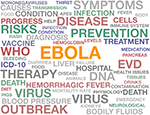
The Ebola outbreak in West Africa in early 2015 had been declared over, but we've since had to rethink this conclusion.
Scientists had always believed once a person recovered from Ebola, they were not only free of the virus, but also immune from future infections. Now we're learning that's not the case.
Some infected people can carry the virus for long periods of time symptom-free and pass it on to others.
One U.S. healthcare worker infected during the outbreak recovered, but months later began having vision problems. The Ebola virus had been lurking in his eye. A British woman, also infected in West Africa, returned home after recovering only to have Ebola-related complications within a few months.
Another new finding that has significant public health implications is finding the Ebola virus in the semen of recovered men. They were symptom free when they passed on the virus to women through unprotected sex.
A Liberian woman died after contracting the virus from a man who had been cleared of the infection for 150-days and tested negative in a highly sensitive blood test. In a study of semen samples from 100 Ebola survivors, half the men carried the virus for up to six months, while a quarter tested positive for up to nine months after symptoms first appeared.
Even though sexual transmission appears rare, the US Centers for Disease Control recommends two consecutive negative blood tests before declaring someone transmission free.
Research on Ebola has intensified since the outbreak. In our ever shrinking world, we're just no longer safe from diseases once considered 'exotic.'